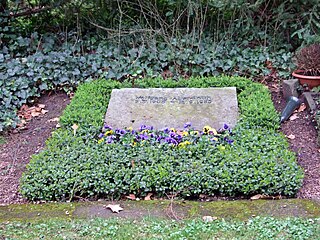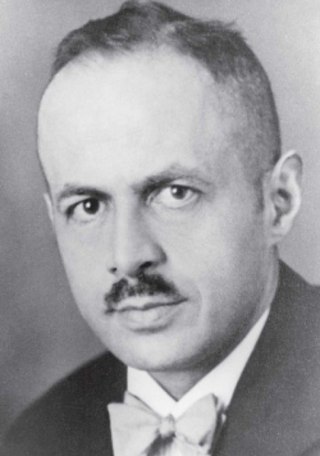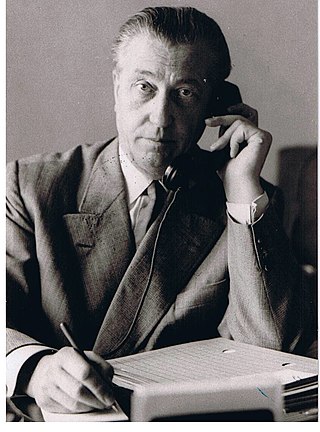Related Research Articles

Hans Josef Maria Globke was a German administrative lawyer, who worked in the Prussian and Reich Ministry of the Interior in the Reich, during the Weimar Republic and the time of National Socialism and was later the Under-Secretary of State and Chief of Staff of the German Chancellery in West Germany from 28 October 1953 to 15 October 1963 under Chancellor Konrad Adenauer. He is the most prominent example of the continuity of the administrative elites between Nazi Germany and the early West Germany.

The Federal Court of Justice is the highest court of civil and criminal jurisdiction in Germany. Its primary responsibility is the final appellate review of decisions by lower courts for errors of law. While, legally, a decision by the Federal Court of Justice is only binding with respect to the individual case in which it enters, de facto the court's interpretation of the law is followed by lower courts with almost no exception. Decisions handed down by the Federal Court of Justice can only be vacated by the Federal Constitutional Court for violating a provision of the German constitution, the Basic Law.

Wolfgang Walter Arnulf Abendroth was a German socialist, jurist, and political scientist. He was born in Elberfeld, now a part of Wuppertal in North Rhine-Westphalia. Abendroth was a radical social democrat and an important contributor to the constitutional foundation of post-World War II West Germany. In 1943 he was forcibly drafted into one of the 999th Division's "probation units" and while stationed in Greece he deserted to the Greek People's Liberation Army (ELAS).

Carlo Schmid was a German academic and politician of the Social Democratic Party of Germany (SPD).

Levin Goldschmidt was a German jurist, judge and academic. He was a Judge at the Reichsoberhandelsgericht and a professor at the University of Berlin. Between 1875 and 1877 he also served as a member of the German Parliament.

Louis Rudolph Franz Schlegelberger was State Secretary in the German Reich Ministry of Justice (RMJ) who served as Justice Minister during the Third Reich. He was the highest-ranking defendant at the Judges' Trial in Nuremberg.

Erwin Konrad Eduard Bumke was the last president of the Reichsgericht, the supreme civil and criminal court of the German Reich, serving from 1929 to 1945. As such, according to the Weimar Constitution, he should have become acting President of Germany upon the death of Paul von Hindenburg in August 1934, and thus the acting Head of State of Nazi Germany. The Law Concerning the Head of State of the German Reich, passed by the Hitler cabinet, unconstitutionally prevented that by combining the presidency with the chancellorship, making Adolf Hitler the undisputed ruler of Germany.

Josef Kohler was a German jurist, author and poet.

Arnold Heinrich Albert von Maybach was a German lawyer, politician and railway manager.

Harry Haffner was a German lawyer and the last Judge-President of the Nazi People's Court.

(Georg) Friedrich Weißler was a German lawyer and judge. Born into a Jewish family and baptized Protestant, he joined the Christian resistance against the Nazi regime after Nazi bullies had destroyed his judicial career.

Erich Ehrlinger was a member of the Nazi Party and SS. As commander of Special Detachment 1b, he was responsible for mass murder in the Baltic states and Belarus.

Heribert Prantl is a German author, journalist and jurist. At the Süddeutsche Zeitung he was head of the department of domestic policy from 1995 to 2017, head of the department "opinion" from 2018 to 2019, member of the chief editors from 2011 to 2019 and is now columnist and author. Since 2002 he has been a lecturer at the faculty of law at Bielefeld University, where he was appointed honorary professor in 2010.
Walter Braemer was a general in the Reichswehr and the Wehrmacht and a high-ranking SS commander during the Nazi era. He was a Nazi criminal responsible for mass murders of the civilian population of Bromberg/Bydgoszcz in Poland at the outset of the Second World War, and later for crimes against humanity in the Holocaust in the Soviet Union. He escaped prosecution and punishment after the war despite having been held for 2+1⁄2 years as a prisoner of war by the British.

The National Judicial Appointments Commission (NJAC) was a proposed body which would have been responsible for the recruitment, appointment and transfer of judicial officers, legal officers and legal employees under the government of India and in all state governments of India. The commission was established by amending the Constitution of India through the 99th constitution amendment with the Constitution (Ninety-Ninth Amendment) Act, 2014 or 99th Constitutional Amendment Act-2014 passed by the Lok Sabha on 13 August 2014 and by the Rajya Sabha on 14 August 2014. The NJAC would have replaced the collegium system for the appointment of judges as invoked by the Supreme Court via judicial fiat by a new system. Along with the Constitution Amendment Act, the National Judicial Appointments Commission Act, 2014, was also passed by the Parliament of India to regulate the functions of the National Judicial Appointments Commission. The NJAC Bill and the Constitutional Amendment Bill, was ratified by 16 of the state legislatures in India, and subsequently assented by the President of India Pranab Mukherjee on 31 December 2014. The NJAC Act and the Constitutional Amendment Act came into force from 13 April 2015.

Ernst Melsheimer was a German lawyer.
Kai Ambos is a German jurist and judge. He holds the teaching chair at the University of Göttingen in criminal law, criminal procedure, comparative law and international criminal law. He served as a judge at the District Court for Lower Saxony between 2006 and 2017. In February 2017 he was appointed to serve as a judge on the Special Tribunal for Kosovo at the International Court of Justice in The Hague. He has authored and edited numerous publications on criminal law and procedure in Germany and internationally.

Hans Peter Bull is a German constitutional lawyer and jurist. He served between 1978 and 1985 as West Germany's first Federal Commissioner for Data Protection. It was widely believed that he was appointed at the eleventh hour only after the anticipated appointee, Spiros Simitis, had turned the job down because previously agreed levels of resourcing were dramatically cut at the last minute. Bull took on the job in an atmosphere of continuing scepticism over the levels of government commitment to data protection and Information Technology legislation more generally.

Hermann Karl August Weinkauff was a German jurist. He served in several positions as a judge and later became the first President of the Federal Court of Justice of West Germany.

Wilhelm Nowack was a German economist who became a journalist and, more briefly, a radio producer. He was also politically engaged. A committed believer in democracy and supporter of the German republic, in 1924 he was a co-founder of the Reichsbanner Schwarz-Rot-Gold movement. Much later, between 1949 and 1952, he served as a member of the ”Bundestag”, based at that time in Bonn. In 1951 he accepted an appointment as State Minister for Finance and Reconstruction for Rhineland-Palatinate, and just over a year later he resigned his seat in the Bundestag.
References
- Hamm, "Die Anstellung der Gerichtsassessoren in Preufsen" (1896) 1 Deutsche Juristen-Zeitung 125 (No 7: 1 April 1896)
- Benno Vogel, "Die Ausbildungs-und Prüfungsordnung für Referendare und Gerichtsassessoren im Kammergerichtsbezirk vom 31. Mai 1947" [1947] Juristische Rundschau, No 1, p 2 De Gruyter
- Haber. Welches Gesetz findet Anwendung auf die Dienstvergehen der preussischen, bei einem Gerichte beschäftigten Gerichtsassessoren? Heinrich. Dresden. 1897. Google
- Zacharias. Denkschrift über die vorübergehende Beschäftigung von Gerichtsassessoren in Privatbetrieben. Guttentag. Berlin. 1912. Google
- Karl Dickel. Ueber Beschränkung der Anwärter des höheren Justizdienstes und die Vorbildung der Juristen in Preußen: ein Beitrag zu § 8 des dem Landtage zur Zeit vorliegenden Gesetzentwurfs, betreffend die Regelung der Richtergehälter und die Ernennung der Gerichtsassessoren. Berlin. 1896. Google
- Morris Ploscowe, "The Career of Judges and Prosecutors in Continental Countries" (1934) 44 Yale Law Journal 268 at 271, 272 and 286 Yale
- 1 2 Civil Affairs Handbook: Germany. Section 3: Legal Affairs. (Army Service Forces Manual M 356-3.) Prepared by the Research and Analysis Branch of the Office of Strategic Services. Headquarters, Army Service Forces. 29 February 1944. Page 18.